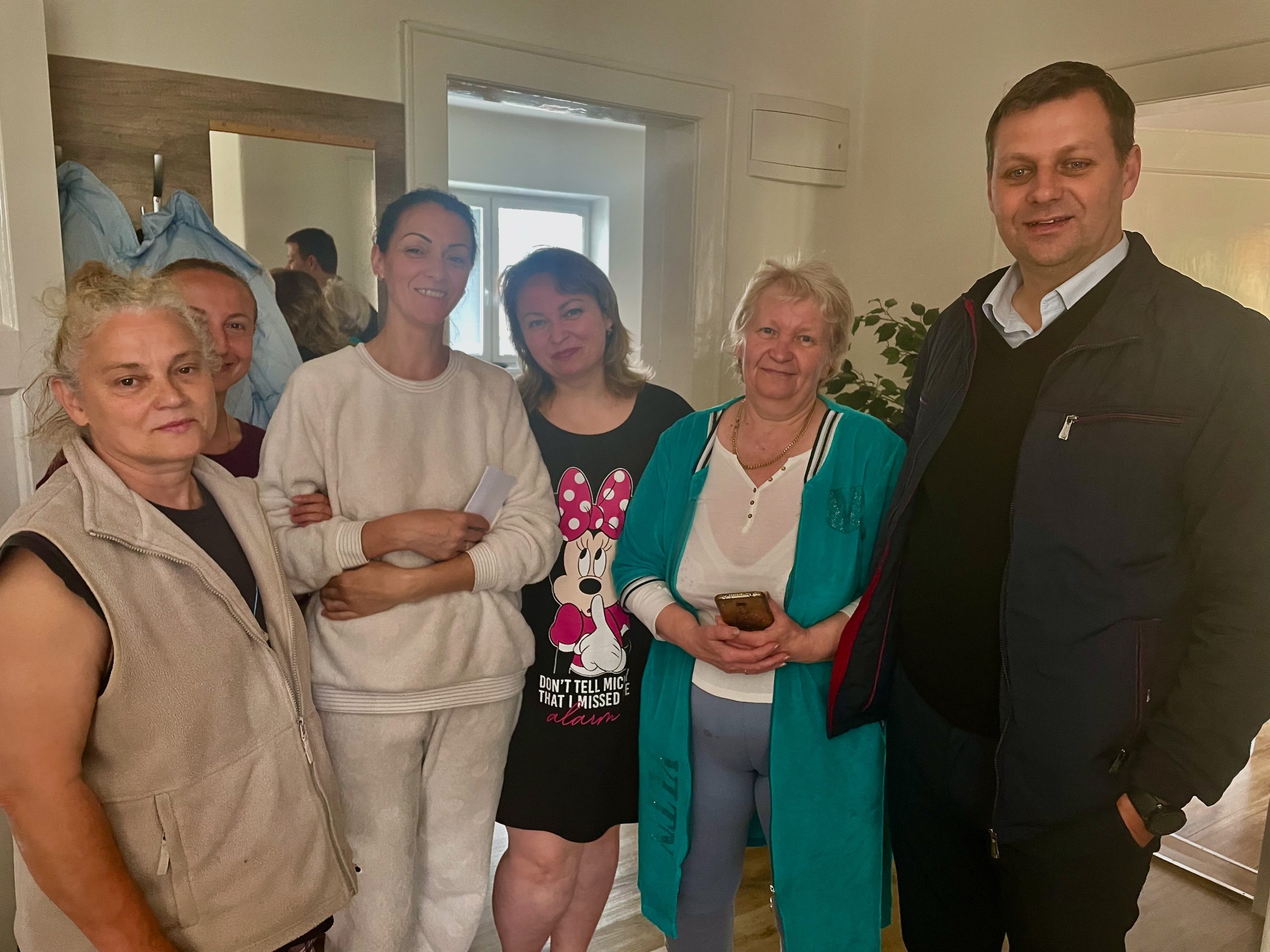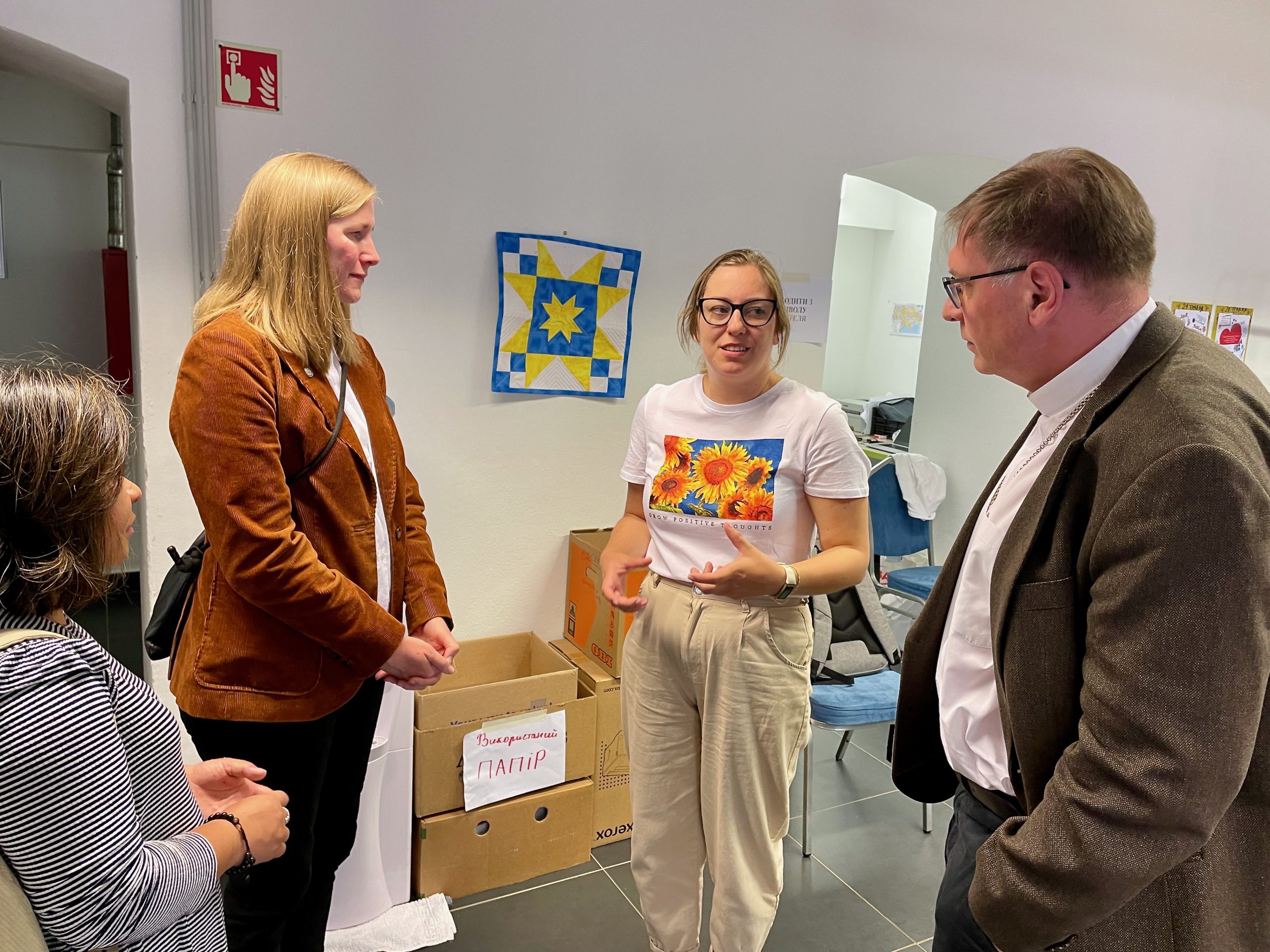When war came to Ukraine and desperate people began streaming across the international borders in the frigid days of late winter and early spring, the Rev. Miroslav Mató knew he and the members of his parish would be called upon to help.
Located in Gerlachov, a small village in Slovakia about 200 miles from the Ukrainian border, Rev. Mató and his wife, Rev. Jana Matóva, prepared to offer refuge.

Rev. Miroslav Mató with some of the refugees from Ukraine that his congregation in Slovakia is hosting.
“Our congregation has three buildings that were used for summer camps for youth,” he explained. “We decided to provide these as houses for refugees … We had almost 100 refugees traveling through our congregation in a few days, and 41 of them are staying for a longer term, saying they are wanting to stay here until the war is over.”
The outpouring of generosity from parishioners has been nothing short of miraculous, Rev. Mató said, with people helping refugees from Ukraine find jobs, enroll children in school and access medical care.
“In these two months, I could see more miracles than in all my life,” he said. “People were helping, they opened their hearts to help, and I could see more and more love than I ever have before.”
The chance to offer refuge to neighbors in need, he told his parishioners, was an opportunity to put their faith into practice.
“I can see a lot of God’s love in this situation,” he said. “As I preached in my sermon [at the beginning of the war], we can now in practice show what we have studied and learned theoretically, we have an opportunity to show it in real life. God is helping us and when we are at the end of our strength, He has always answered our prayers.”
Another Lutheran pastor in Slovakia, the Rev. Michal Belanji, recalls immigrating from Serbia with his parents as a teen, to escape the war that tore apart his home country in the 1990s. The church was there for his family in their time of need, he said. Today, his church in Janoskov is hosting 38 refugees from Ukraine.
“We help because we were helped,” he said. “It’s the reason why we are here.”
All over the region, Lutherans have opened their hearts, homes, churches and communities to people fleeing the war in Ukraine. According to data from the United Nations High Commission on Refugees (UNHCR), as of June 21, approximately 2.8 million of the 8 million people who fled at the start of the war are still in neighboring countries. Others have either moved on to other countries or returned home to Ukraine. Poland is currently hosting 1.2 million of those refugees; Slovakia 79,000 and Hungary 25,000.
A Lutheran Legacy
The Lutheran legacy of welcome goes back a long way.
“When the Lutheran World Federation was established 75 years ago, in the whole of Europe there was a refugee crisis after World War II,” explained the Rev. Tamás Fabiny, presiding bishop of the Evangelical Lutheran Church in Hungary (ELCH). “People had to leave their country and go to a different place. So that is already part of our identity … to be a Lutheran is to welcome refugees.”

Rev. Tamás Fabiny (far right), ELCH Bishop, with a volunteer teacher at a school for Ukrainian children in the basement of the ELCH offices in Budapest.
Lutherans in the U.S. established a ministry of welcome in the era of World War II, Lutheran Immigration and Refugee Service (LIRS), founded in 1939. LIRS resettled more than 30,000 refugees from Germany and elsewhere in Europe in the aftermath of the war, and has since assisted more than 500,000 refugees from all over the world to rebuild their lives in the U.S.
While the current situation in Ukraine is creating the largest refugee crisis in Europe since World War II, other conflicts over the years have also led people to seek refuge and provided opportunities for the church to live out its ministry of welcome. An attempted Hungarian uprising against communism in 1956 led nearly 300,000 people to leave the country, Fabiny said, and many of those people built new lives in Austria, Germany, and even the United States thanks to the welcome of Lutherans.
“I had the opportunity to visit several of these Lutheran communities,” he said, and “people told me how wonderful it was that they were received by families who gave them shelter, helped them find a job, or the church was opened for them. So we know what it is to be a displaced person because hundreds of thousands of people left Hungary in ‘56.”
The end of the Cold War and the Romanian revolution in 1989 also brought refugees to Hungary, he said, as did the Balkan war in the early 1990s, and the civil war in Syria in 2015. When he put out a video statement in support of welcoming refugees, as part of a 2017 UNHCR campaign, however, he received a great deal of backlash for his message. The political climate in Hungary had become more hostile toward refugees, he said, and his message of welcome was not well received by the general public.
But part of his role as a church leader, he says, is to speak out against injustice, following in the footsteps of Dietrich Bonhoeffer. It is important for the church not only to act in service to our neighbors, he says, but also to pray and reflect on our calling as Christians to work for peace and serve our neighbors.
“We have to reflect theologically on war and peace,” he says. “We had to learn from the Nazi time when many churches were supporting Hitler theologically. There were just a few, like Bonhoeffer, who criticized [Hitler]. I think it is very important for us as a church to have prayers, of course, and also theological reflection. Action should come after that.”
Emily Sollie is a freelance writer, editor and communications consultant. She lives in Washington, D.C. with her husband and 4-year old son, and is a member of Lutheran Church of the Reformation.

